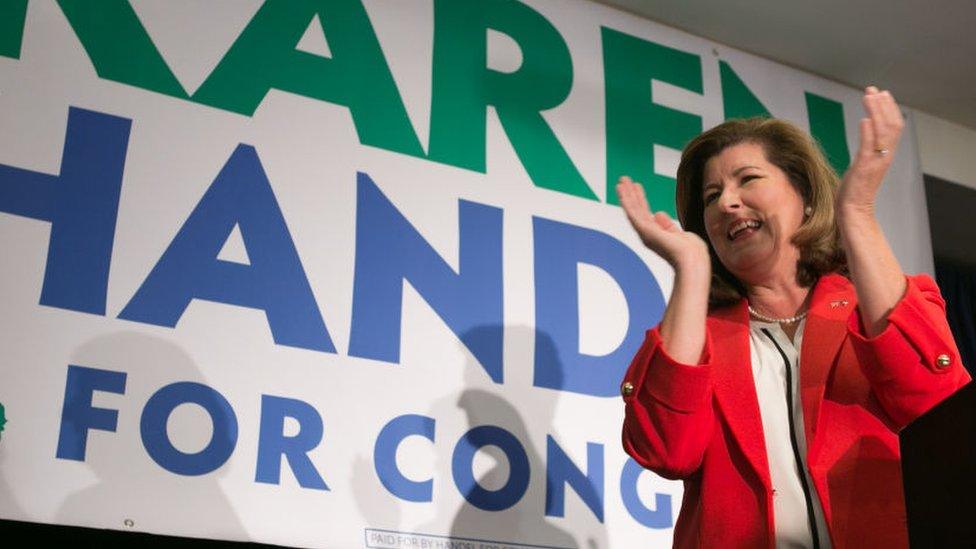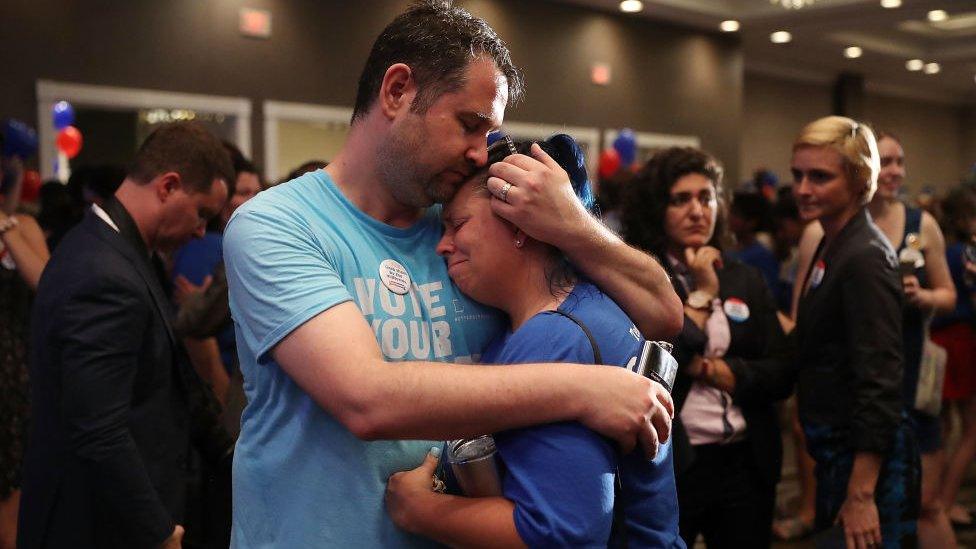After another bitter loss, can Democrats ever top Trump?
- Published

A party can't build a governing majority with moral victories.
On Tuesday Democrat Jon Ossoff came close to beating Republican Karen Handel in a Georgia congressional district that has been historically conservative but trending left. In the words of the immortal Ricky Bobby of Talladega Nights, however, "If you're not first, you're last".
There have been four congressional special elections this year where Democrats and Republicans have gone head-to-head, and the Democrats have been "not first" in all of them. That prompted Donald Trump to take a Twitter, external victory lap on Tuesday night.
"Well, the Special Elections are over and those that want to MAKE AMERICA GREAT AGAIN are 5 and O!" he wrote. "All the Fake News, all the money spent = 0".
The president's math is a bit off, of course. He's probably counting the Georgia primary, in which Mr Ossoff finished first, as a "win" and ignoring a California congressional election where no Republicans made it to the final round of balloting.
Nevertheless Georgia's result has to be considered a demoralising blow to Democrats nationwide, who may be wondering if they'll ever be able to break through against a president whose low approval ratings, in their view, should make him, and his entire party, toxic.
Here's a closer look at what it all means - and where both parties go from here.
The importance of Georgia
The battle of Gettysburg was important not because the tiny Pennsylvania town had any strategic significance. It was the turning point of the US Civil War because that's where the two armies decided to fight.
A similar dynamic was at play in Georgia over the past few months. Democrats and Republicans made the Atlanta-area congressional district a pivotal battleground because both sides committed unprecedented resources to the effort. Mr Ossoff raised tens of millions from donors across the US, and the Democratic Party added hundreds of thousands of dollars from its campaign coffers.
Georgia vote is most expensive election in history
Republican outside political groups and deep-pocketed donors, like casino magnate Sheldon Adelson, also poured money into the race.
Even though the Georgia seat is just one of 435 that will be up for grabs again next November the race became pivotal because both sides acted like it was.
What it means for the Democrats
Strategic concerns. Cue the circular firing squad. Already Democrats are questioning whether Mr Ossoff ran too cautious a race. Although he was the darling of the Democratic base - drawing on the same passionate small-money donors as populist Bernie Sanders in his presidential bid last year - he ran as a moderate, emphasising fiscal responsibility, "humility" and modest reforms of the current healthcare system, rather than the more sweeping liberal policies advocated by many on the left. The loss here is already starting to rekindle some of the Clinton v Sanders acrimony from last year's Democratic primary.
Pelosi questioned. The long knives are also starting to come out for House Minority Leader Nancy Pelosi, who some Democrats view as an ill-suited leader for the party. Republicans repeatedly hit Mr Ossoff for his supposed ties to the San Francisco liberal who has become a bogeywoman for conservatives, and on Wednesday one Democratic congressional hopeful announced his candidacy with the promise to support someone other than Ms Pelosi if he's elected.

Democrats used Mr Ossoff's candidacy as a referendum on President Trump
Dollars at risk. Mr Ossoff's disappointing finish despite his record fundraising haul could also discourage future Democratic donors, left wondering whether their contributions have been well-spent. The Democrats' $23m war chest would have gone a long way to help candidates across the nation in next November's mid-term elections. They better hope there's more where that came from.
Warm bodies in demand. One of the keys to a successful mid-term election is putting as many seats in play as possible by recruiting capable, compelling candidates. Congressman Ossoff would have been a perfect poster boy to encourage other Democrats to take the plunge next year. If a 30-year-old former filmmaker can come from nowhere to win, why can't they? Now, however, it may be harder to get quality candidates to commit to the meatgrinder that is a modern US campaign.
What it means for Republicans
Non-toxic Trump. According to a recent Atlanta Journal-Constitution poll, Mr Trump's approval rating, external in Georgia's sixth congressional district stood at 35%. Despite the president's low popularity, Republicans turned out for their party's candidate in record numbers for a special election. While they may not love the president, they either continue to dislike Democrats more or see their cause as bigger than one man, even if that man is the supposed face of the party.
Agenda back on track. If Ms Handel had lost on Tuesday Republicans would be running for their political lives. Members of Congress staring at close elections would likely bail on any legislation that could cost them votes, including efforts to enact relatively unpopular conservative healthcare reforms, which are entering their critical final stages, and the upcoming contentious fight over tax reform.

Ms Handel thanks House Speaker Paul Ryan and President Trump in her victory speech
Retirement parties delayed. One tell-tale sign that a party sees an electoral rout on the horizon is when its senior politicians start heading for the exits. The prospect of a cushy lobbying job or a life of honorary board memberships can seem preferable to defeat at the ballot box or the frustrations of minority-party status. If Mr Ossoff had prevailed, a lot of Republicans would have been facing some hard choices. Instead, there may be reason to stick it out. Although the closeness of the race means the Republican House majority is still at risk, the Georgia seat is one that would likely fall in a wave midterm election.
A pleasant distraction. Mr Trump and the Republicans had been on the ropes of late, with a seemingly never-ending stream of stories about White House palace intrigue and unpleasant revelations from the ongoing investigations into possible Russian ties to the Trump campaign. Tuesday's win gives the party the opportunity to change the conversation, at least temporarily, and may give the media cause to reconsider whether all the eye-popping headlines and blockbuster scoops are really resonating outside the environs of the nation's capital.
Democratic silver linings
Those on the left will note that the Georgia race, decided by just under 4%, marked a significant tightening over past few races, where incumbent Republican Tom Price often doubled his opponent's vote total. The Democrats there, it appears, are trending in the right direction
If the party faithful want some real encouragement, however, they should look to the congressional race in neighbouring South Carolina, which also took place on Tuesday.

Supporters of Jon Ossoff were overcome with tears during the candidate's concession speech
The South Carolina seat, previously occupied by current White House budget director Mick Mulvaney, largely flew under the national radar, but the Republican margin of victory there turned out to be narrower than in Georgia.
In a midterm wave election that cuts against the incumbent party - which is what Democrats are hoping for next year - the challengers tend to benefit from motivated voters on their side and the apathy of their opponents. The bright spotlight and vast resources spent on Georgia prevented that from happening on Tuesday, but next November - when all 435 seats in the House are up for grabs - the races might end up looking a lot more like South Carolina's low-turnout affair.
If that's the case, there are plenty of places where political balance is a lot closer than South Carolina's, perhaps suggesting the seats could tip to the Democrats.
Two moral victories on Tuesday instead of one probably isn't much of a comfort to Democrats right now, but it's a place to start.
What's next?
It's going to be a long summer for Democrats, as the next chance for their party to post some - any - electoral wins won't come until November. At that point, the terrain becomes friendlier, as the big prizes will be governors' races in Virginia and New Jersey.
With higher expectations comes greater pressure, however. A loss in either of those races will turn Democratic discouragement into outright despair.